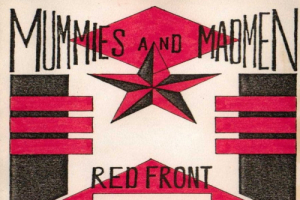
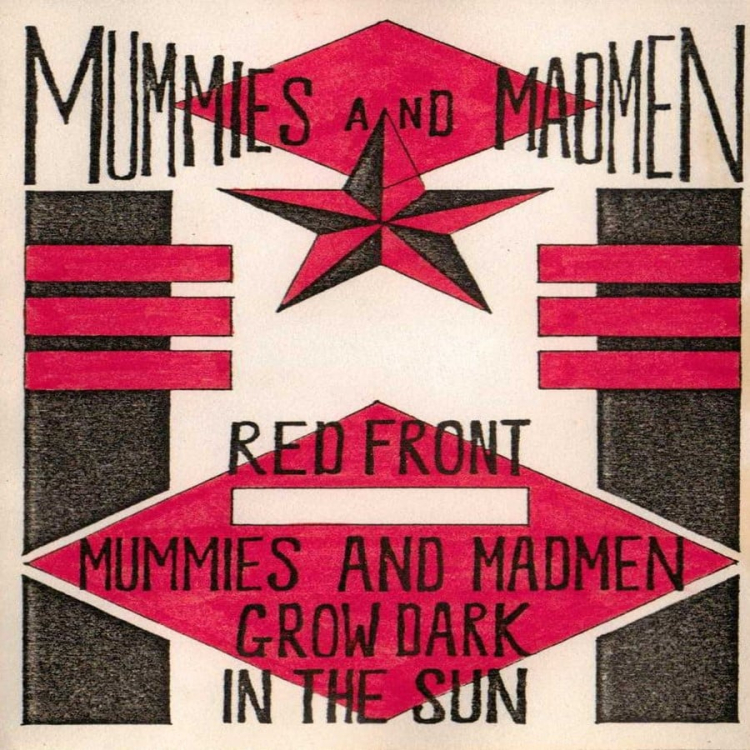
There has been a flurry of Alan Rider related releases from books to music recently as well some a bit further back. Did you plan at the time of Stress or Dance Naked re-releases to A, Release a few books? and B, Reissue Mummies and Madmen?
Nice though it would be to say I had a master plan, I’m sure it won’t surprise you to know that these things tended to happen largely as a result of chance conversations, connections, and happy accidents. I am a firm believer in chaos theory and that there is an order and a reason for everything, even if masked by confusion, chaos and randomness. Call it fate, or what you will, but these things happen because they were always going to happen. At the time of the Stress and Dance Naked re-releases, which came out on three separate Labels in the US, Russia, and Germany, I wasn’t even thinking about doing books, and had forgotten completely about Mummies and Madmen. I’m sure we covered in a previous conversation for Brutal Resonance how the books came about didn’t we? Basically, it was through random conversations with Richo, the head of Fourth Dimension Records, who also publishes books. He produced an 80’s/90’s fanzine (Grim Humour) himself so said he was interested in publishing a book on Adventures in Reality and also my book on Coventry punk/post-punk fanzines, which was already largely written. The Mummies and Madmen album release came about in a similar way. I came across a copy of the original 1984 cassette, which I thought had been long lost, during a sort out at home and posted a picture online (as you do!). He then messaged me saying ‘why don’t we put this out as an album? It was originally going to be on vinyl, but as everyone knows there are a lot of costs and pressing delays with vinyl, so we switched to do it as a more economical and quicker to release CD instead. Having said that, it still took 4 years for it to come out!
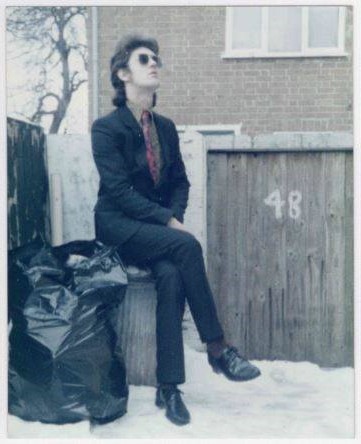
Nearly, if not everything, you
have released, re-released or reissued has at least one common element, which
is your label your alter ego, Adventures in Reality. Where does Mummies and
Madmen fit into this timeline? Also take us through the two recording sessions.
What stands out when you think about the all of the work? What were the
reactions to it? Etc
I’m going to have to paint you
a picture of how I was living at the time to give you the context. I was living in a
house I shared in Coventry, England with members of Attrition. It was a former
Hells Angel’s Chapter House, so had a rather unusual look with tombstones the
Angels had stolen from the local cemetery littering the garden, and regular
visits from Hells Angels looking for their mates, and Police looking for those
same mates, who had usually absconded from jail. My friend, Attrition
percussionist Bob, lived on the other side of town in a house he rented and
shared with a wonderful character called The Great Bone, who was like a budget
Captain Beefheart. Guitarist Cryptic Z Mostman was another crazy character who
shared the former Hells Angels house with me at the time. Bob used to make this
really strong home brewed beer that had an almost hallucinatory effect, which
we drank as it was all we could afford. His living room had a collection of
beer glasses taken from the local pubs hanging on hooks around the walls and
the smell of the beer constantly brewing in buckets in the kitchen wafted
around the house. That
was where Mummies and Madmen was formed and the album recorded. This took place
whilst both Stress and Adventures in Reality (as a label) were going and was
shortly before I de-camped from Coventry to London to begin the next chapter in
my life (and experience even more basic, eccentric, and sometimes dangerous,
accommodation!). Mummies
and Madmen were never intended to be a full time band, or even to last longer
than the day we formed. It
was basically just the three of us deciding to have a mess about together and
see what happened. It
was a hot day when we recorded, so we had all the windows open and there were
these really noisy birds right outside the window tweeting away. We could have closed the
window to stop the tweeting and roasted, but as they seemed so keen to be a
part of the recording, we stuck a microphone out of the window and recorded
them for use in the track. That’d
be called ‘field recording’ now, but at the time it was just called ‘sticking a
microphone out of the window’!
Although it’s hard to imagine
now, when you can do so much just with your phone, the recording facilities we
had were very, very, basic, with just a four track cassette portastudio to
record on, a Wasp Synth, tape echo, and guitar. It was possible to ‘bounce’
tracks down to record more overdubs, but unlike with digital, the quality went
down every time you did that, so we recorded it all ‘live’ in one take (apart
from adding the bird song!). Loops
were just that, long loops of ¼ inch tape draped over chairs and fed into the
tape delay with silver paper stuck over the erase head so the loop wouldn’t get
wiped out as it played. The drum machine was a Boss DR55 Dr Rhythm – pretty
much the simplest drum machine going (I still have it!) - run at maximum tempo
so it made a throbbing sound. The
4 track had two tape speeds to choose from, so if you recorded at the lower
speed and played back at the higher speed, you could speed things up (and vice
versa). It was all very physical and hand made, but the ingenuity needed meant
it was both challenging to do, but also a lot more fun than simply clicking on
a mouse as you’d do now. That’s
kind of why it sounds like it does and why it has that ‘vintage’ appeal. As far as reactions
at the time go, remember, these were only small scale cassette releases. Whilst a bigger
cassette label like Adventures in Reality, with its Rough Trade distribution
arrangements, could sell hundreds, and sometimes thousands, of each release,
this one came out on the far smaller Slob Tapes run by Bob and probably sold
fewer than 40 at the time, largely by mail order. We hope it will do a
bit better than that this time around though!
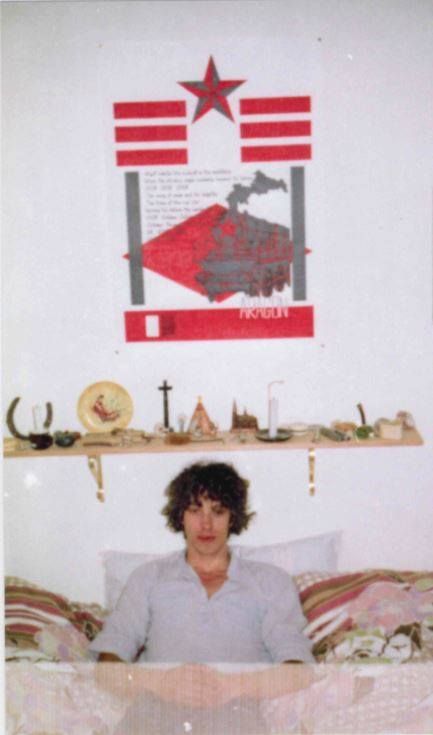
How does Mummies and Madmen
reflect the zeitgeist of the time with music, DIY expression etc?
As we’ve discussed, this was
just the sort of thing that went on then. ‘Bedroom bands’ is an unkind term as
many well-known acts started out that way, but the ‘anything goes’ nature of
it, and the feeling that things were changing in that you could now do home
recordings rather than have to go into a studio, and you could release music on
cassette rather than have to invest in vinyl pressing, was a revelation and
really opened things up in the same way Bandcamp has today. That sparked off all
sorts of creativity. Ok,
a lot of it wasn’t very good, but that’s equally true of Bandcamp isn’t it? The important thing
was that you could do it yourself and the power had switched from major labels
to really small independents. That
was especially important a change for me, as I then set up a cassette label,
which in those days could actually snag major distribution if you were pushy
enough – in my case through Rough Trade, which also got my releases into Tower
Records in the US. The
fact that we could just get together, record something, and put it out, and do
all of that by ourselves without needing to send demos to record companies and
get knocked back, or having to borrow loads of money off family to press a
record, was just brilliant. Its
normal now to release albums on Bandcamp, having recorded it on a laptop using Garage
band and this was really the forerunner of that.
Aside from yourself, did
Mummies and Madmen have any impact to how you and Puppy38 came up the Senestra
project given the styles share a very DIY experimental nature?
Senestra was really formed
initially to record the ‘Stanford’ album, as that was an idea I’d been sitting
on for a few years and was keen to see happen on CD or record. Mummies and Madmen
didn’t have a direct influence on that, other than it formed a small part of my
personal background. Senestra
was planned, Mummies and Madmen wasn’t. Senestra’s album came
out on Fourth Dimension (though it was a joint release with Adventures in
Reality), Mummies and Madmen we originally put out ourselves. So the main
similarity is the approach, which was decidedly un-technical and experimental. I’ve never really
thought of myself as a ‘musician’. I
can’t read music and if someone said “this is in F Minor”, I’d wonder what they
were on about! I’ve
always approached things with the attitude of ‘if it sounds good, it is good’
rather than worry about what is musically right or wrong. Puppy38 is far more
technically skilled at the electronics and recording side than I, but as Steven
Wilson (Bass Communion) recently told me Frank Zappa once said, you should
always be the worst musician in your band, meaning it’s always a good thing to
work with people who are more skilled than yourself.
What lead to all of diversity
in the projects you have been involved with? Stress is so vastly different in
sound than Mummies and Madmen. How did find your way to expanding the
boundaries of your own music expression? How much was it was just you and how
much impact did other members of the projects have?
I think the other members had
a huge influence. Stress
was very much an equal partnership to begin with, though as it went on it
relied almost totally on me to record, release and promote the music. Stress were actually
quite experimental when we started out and had what we would now call a Cold
Wave sound, before we went a lot more electronic with the use of cut ups and
sequencers. The
songs were always relatively structured and built around the lyrics though, as
was the successor band Dance Naked, which had a very different sound and was
Goth in image. When
I look at some of those old photos, we were just SO Goth at that time! Musically though, we
differed from a lot of our Gothic contemporaries in that we had bass and
synths, but deliberately had no guitar. We never had a
guitarist in the band. We
once brought in a guest guitarist from another band in a studio session for
just one track, but that was it. I’d aways been involved in experimental,
industrial and electronics though, through the Adventures in Reality label
putting out stuff by acts like Attrition, SPK, Test Department and others, plus
my more direct involvement with Attrition themselves at the time, and
performing in Stress of course. Being a part of that early UK industrial scene
meant I have built up a decent collection of vintage synths over the years and
have naturally evolved in that direction. I started out as a bassist
though, so still enjoy twanging on that alongside the synths. Those skills never go
away! I would
say though that although I have perhaps needed to take a more directing and
leading role in all of the acts I’ve been involved in, everyone has been
equally important to how it ended up sounding and that process continues with
Senestra.
What was one of the, if not
the most memorable things someone said about Mummies and Madmen? Also how did
the Mummies and Madmen come to be the name of the project?
As I said, Mummies and Madmen
were pretty underground at the time, so I don’t think anyone really said very
much about us back in 1984. I’m
hoping they will say more now though. I do rather like Richo from Fourth
Dimension’s description of us as “garbled electronics, distant planet serrated
guitar churn, basement Wobble-esque bass, primitive rhythms and the kind of
spoken word that wouldn't seem out of place on a record by The Fall or The
Shadow Ring”. The name ‘Mummies and Madmen’ was coined by Bob Oliver in the
band. I have
absolutely no idea what he was thinking of at the time or where he got that
name from!
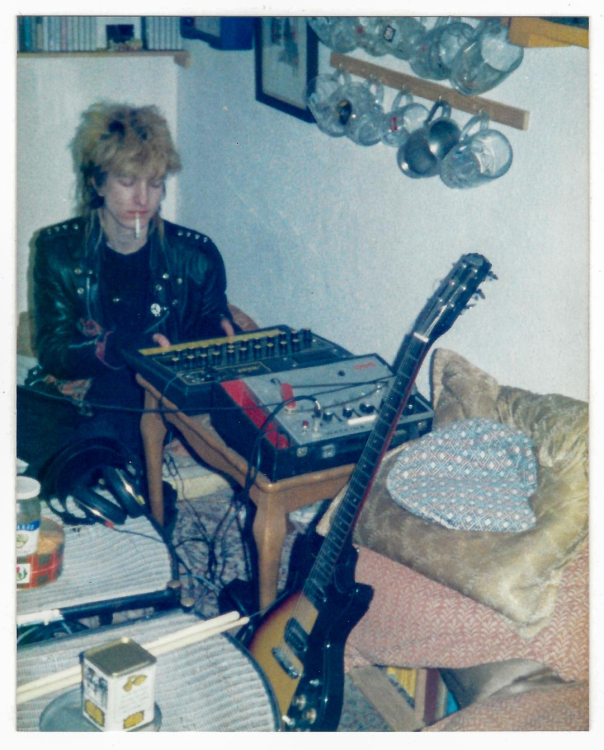
How did the DIY ethos of punk
play a part in this release? In my review of Mummies and Madmen, I sensed the
vibe of the early 80's tape trading/DIY/cassette and fanzine culture throughout
the 40 plus minutes of experimental sonic mayhem. It was a similar feeling (not
necessarily in sound) when ordering punk demo tapes out of Maximum Rock N’
Roll. There was an organic feel, nothing too organized, just a few people
getting together with some equipment to express themselves.
As I said, it was all very
spontaneous at the time. Not
really organized at all, but very much the sort of thing that just happens when
you have a bunch of like-minded people kicking around together with a bit of
spare time on their hands. The
home brewed beer certainly helped too! We were all involved
in that early ‘80’s tape scene and in the case of Adventures in Reality, that
was relatively big on the scene, as was the fanzine, which is why there are
books published on it and it continues to be referenced in books about the
scene at the time, such as the recently published Zerox Machine book on UK
fanzines. As
countless others have said, none of this would have happened without punk, but
the important period was really the post-punk period from 1979 on. That’s when punk
became independent. Up
to then, the original punk bands were all on major labels, or smaller labels
financed by bigger ones, and were appearing regularly on mainstream TV and in
the mainstream media. Once Rough Trade came along that all changed. At that point things
really opened up for everyone and the music expanded in all directions, with
new labels like Fast, Factory, Mute and so on setting up and doing really well. The Sex Pistols may
well have been the high profile and photogenic media face of punk, but
post-punk bands like PIL, Killing Joke, ATV, Crass, Joy Division, Human League,
Cabaret Voltaire, Throbbing Gristle and others were the true legacy. Mummies
and Madmen were clearly not in that league, but we were part of that tradition
and attitude for sure.
When is the next
collaboration? What's left in the vaults of Alan Rider? I know you mentioned
reissuing some of the Adventures in Reality cassettes a while back. Is that
still a thing? Will we see Mummies and Madmen eventually on vinyl or even
cassette?
“We seem to have this same
conversation each time! There
is still unreleased Stress material that may surface at some point (though no
firm plans yet), and Senestra are recording the follow up album to ‘Stanford’. I have a couple of
side project collaborations with Glenn Wallis (Konstructivists), who lives
close to me, and Martin Bowes (Attrition), both in the early stages. I have been working
on a book for a while now giving the inside story of Third Mind Records, who
launched the careers of Front Line Assembly, Nurse With Wound, and others. That’s taking me a
long time though, as I don’t want it to just be a list of releases, or a long
interview with Third Mind Records former head. I have most of the
material I need, and have spoken to many of the key players, but every time I
start on it, I change my mind about how it should be and have a re-think! I also write
regularly for a website called Outsideleft doing interviews and reviews, which
keeps me quite busy. For
example, last week I interviewed David J from Love and Rockets/Bauhaus, and
Steven Wilson (Bass Communion, Porcupine Tree), alongside doing book and music
reviews and creating a whole week of features on Attrition to celebrate their
new album coming out. There is also the cassette label to get up and running to
reissue those rare Adventures in Reality cassettes. I don’t think Mummies
and Madmen will get a vinyl release now, unless someone reading this makes me
an offer! It might be worth doing a limited run of cassettes though. Good suggestion! I don’t feel any
pressure to be prolific all the time though. There is a certain
snobbery and sense of pride expressed by some very prolific acts, who see
volume and speed of release as measures of value when producing their music. Some of them can
sustain that and maintain the quality, but personally, I don’t see the point in
filling up Bandcamp with material as fast as I can just for the sake of it and
because I can. I
have a friend who is a solo musician and he is now using AI tools to both
produce all his music and lyrics for him so he can release an album a week on
Bandcamp. He has
released literally hundreds of albums, all numbered rather than named, but
practically no one listens to them! That is a consequence
of the broken economic system we have that values productivity and producing
ever greater volumes of stuff all the time. That’s obviously
completely crazy and totally unsustainable and I don’t want to be adding to
that huge pile of landfill. I’d
rather produce things I have thought about more and think are worthwhile and
also only release things that primarily come out in a physical format, rather
than digital only. That
naturally limits the amount that can come out. As it involves more
investment in time and money, and getting commitment from others, it also
forces me to be pickier. That’s
a good thing. The
world needs a lot less stuff really, so being less productive actually makes
obvious sense to me. That’s
a good note to end on!
Thanks Alan!




